Fixing and flipping houses has become an exciting and profitable hobby (and sometimes full-time career) for many people, but these delicate real estate investments can be trickier than they seem.



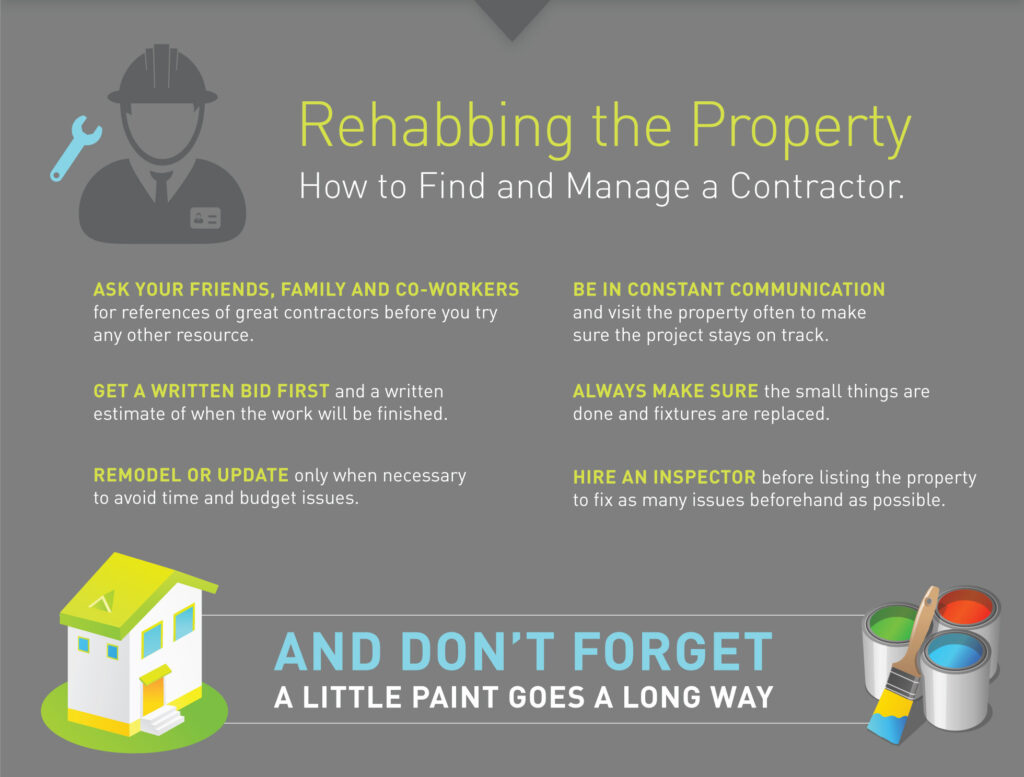
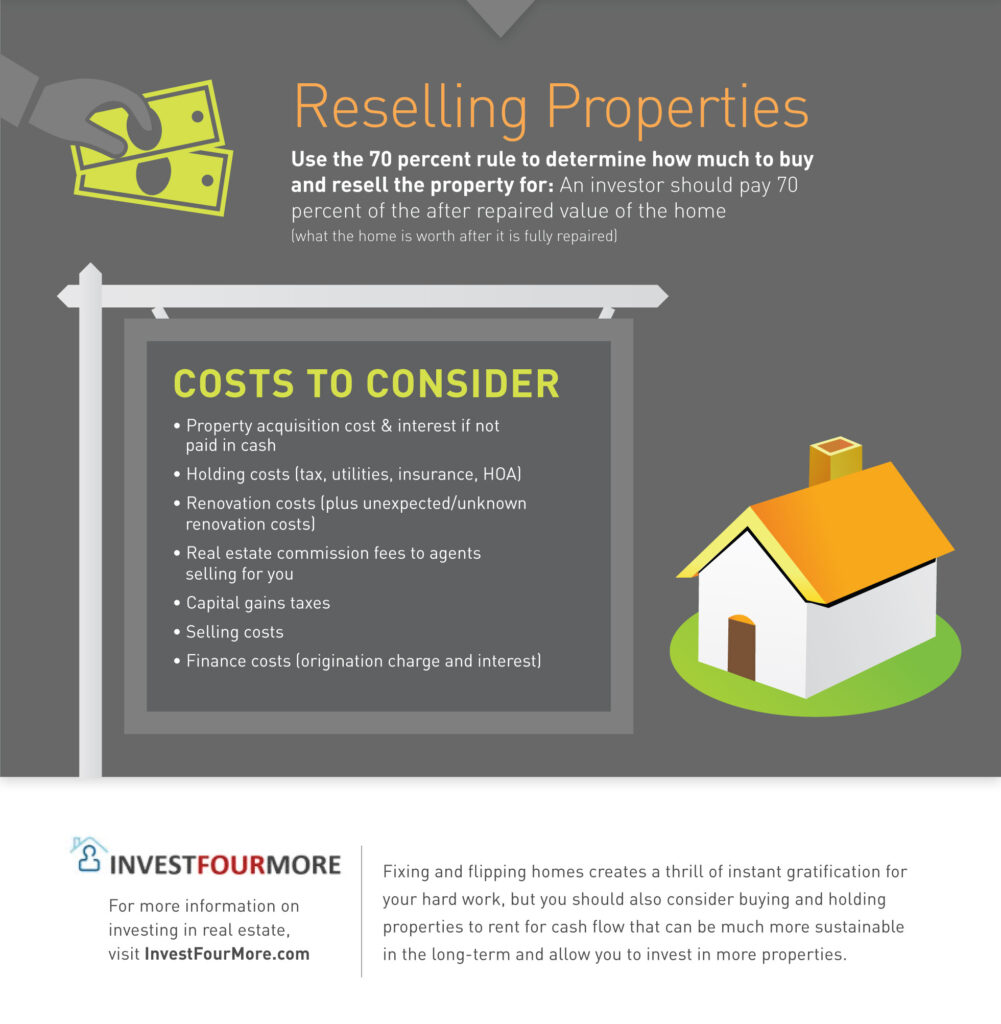
Fixing and flipping houses has become an exciting and profitable hobby (and sometimes full-time career) for many people, but these delicate real estate investments can be trickier than they seem.






Alana Semuels for The Atlantic asks “Can Portland Avoid Repeating San Francisco’s Mistakes?”
“This city that prides itself on being different has been experiencing a problem all too common of late. It used to be unique, people say, a utopia where people could get tattoos and ride their bikes everywhere and just be weird. Portland was so affordable, as the slogan went, that young people went there to retire.
Then the city got “discovered,” people started flocking here, the tech companies came, and Portland became more expensive. Oregon has been the top destination for people to move to for three years in a row, according to United Van Lines.”
I don’t normally point to articles but this one, in my opinion, very important for all of us.
https://www.apartmenttherapy.com/what-to-do-during-ice-raids-36625315

As the events of the last few years in the real estate industry show, people forget about the tremendous financial responsibility of purchasing a home at their peril. Here are a few tips for dealing with the dollar signs so that you can take down that “for sale” sign on your new home.
Get pre-approved. Sub-primes may be history, but you’ll probably still be shown homes you can’t actually afford. By getting pre-approved as a buyer, you can save yourself the grief of looking at houses you can’t afford. You can also put yourself in a better position to make a serious offer when you do find the right house. Unlike pre-qualification, which is based on a cursory review of your finances, pre-approval from a lender is based on your actual income, debt and credit history. By doing a thorough analysis of your actual spending power, you’ll be less likely to get in over your head.
Choose your mortgage carefully. Used to be the emphasis when it came to mortgages was on paying them off as soon as possible. Today, the debt the average person will accumulate due to credit cards, student loans, etc. means it’s better to opt for the 30-year mortgage instead of the 15-year. This way, you have a lower monthly payment, with the option of paying an additional principal when money is good. Additionally, when picking a mortgage, you usually have the option of paying additional points (a portion of the interest that you pay at closing) in exchange for a lower interest rate. If you plan to stay in the house for a long time—and given the current real estate market, you should—taking the points will save you money.
Do your homework before bidding. Before you make an offer on a home, do some research on the sales trends of similar homes in the neighborhood – ask me to help with that. It’s my job! Consider especially sales of similar homes in the last three months. For instance, if homes have recently sold for 5 percent less than the asking price, your opening bid should probably be about 8 to 10 percent lower than what the seller is asking.

Address:
Area of town
Number of bedrooms
Number of bathrooms
Total square footage
Office/den/bonus room
Purchase Price
Terms of HOA (e.g., month-by-month, yearly)
Taxes
Elevation (what floor?)
Concierge
Location (e.g., near shopping, near bus)
On-site parking
Security system
Heating (e.g., central, forced air)
Cable
High-speed Internet access
On-site storage
Laundry facilities
Fireplace
Vaulted ceilings
Floors (e.g., carpet, hardwood, tile)
View (e.g., water, city, mountain)
Fitness facility
Pool
Club room
Social events
On-site management
Age of building
Pet restrictions
CC&R’s
Health of HOA Finances
Other features
Oh. My. Gosh. How crass can she possibly be?
I know, right?
I hate doing it, but I think that a lot people are confused about how real estate agents get paid.
We are, by and large, independent contractors, associated with our brokerages. We are not “employed” by the brokerage. I am not a RE/MAX employee. I’m not even a RE/MAX Select (the franchise) employee. I’m an IC.
I Do Not have a salary or hourly pay.
We get paid on commission. That means that only when a house is SOLD, papers signed, keys turned over, deed recorded – only then, do we get paid.
Here in Oregon, the real estate fee is usually paid by the seller. For example, the agent and seller agree that the agent will receive a percentage of the sales price as compensation. Normally, the selling agent shares half of the commission with the buyer’s agent, called the BAC (Buyer’s Agent Commission).
Consider the following hypothetical:
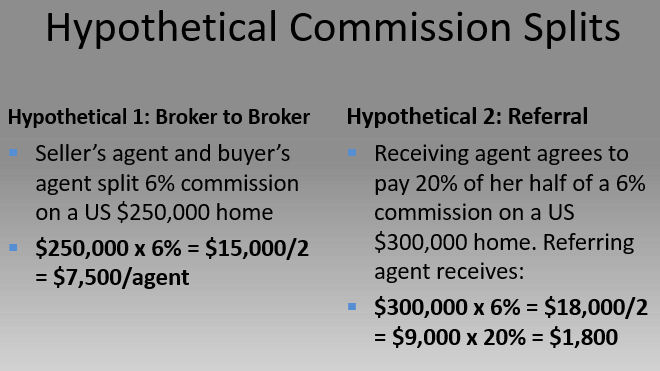
“Idaho Broker”, says “Breaking it down a little further:
Assume a $1 fee is charged to list/sell a home:
50 cents (half) might go to the agency selling the home leaving 50 cents for the listing company;
Take off franchise fees (if any they vary so take 6%) of 3 cents leaving 47;
Assume the agent is on a 75/25 split with their Broker that would leave the agent with 35 cents.
That $0.35 is essentially the agents “gross” income out of the $1.
Pay IRS estimated 25% leaving $0.26; (will be different based on itemized expenses);
Pay self-employment tax since you have to pay both sides of social security contributions of 15% leaving $0.22 to start paying expenses with!”
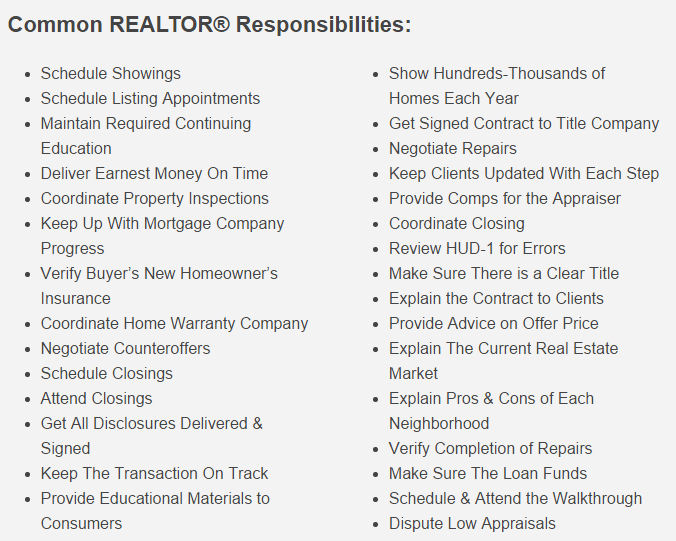
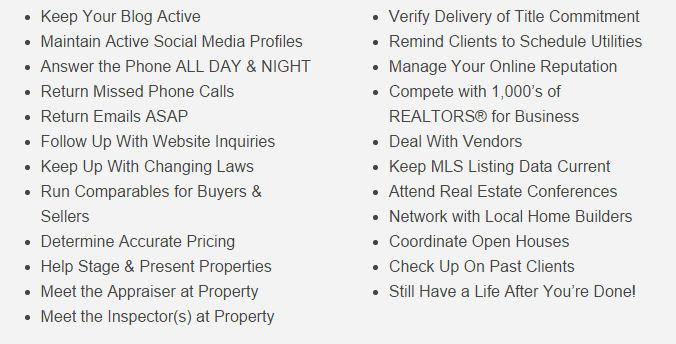
What Does a REALTOR® Do To Earn Their Commission?, by Andrew Fortune
Before I get to take my check (that my broker writes, minus all of my office fees) home, I have to write a bunch of business checks, first, because practicing real estate and helping people find the perfect home is really expensive.
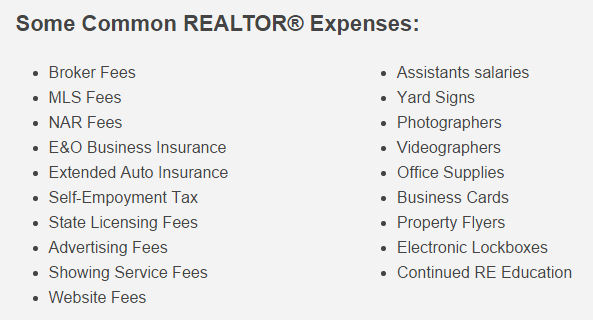
All that time researching prospective homes, advertising your house to sell, gasoline, driving you around to see houses, our professional fees like the lockbox key, personal advertising, assistant payroll fees, access to the forms program, the forms signature program, and the time and expertise for all of those emails, phone calls, questions answered and solution mining, contract forms written, etc. comes out of our own pockets until you actually buy or sell a house and that’s after our commission split, mothership fees, office fees, insurance, and transaction fees are deducted.
The point: we get our feelings a little bent when we work hard with a client, showing houses, giving real estate 101 lessons, providing moral support, staying in constant communication with both client and lender, and building a clear idea of what the buyer is seeking, and then they decide to work with someone else to write their contract. Does it happen? To everyone? Heck yes. It’s just a part of doing business for us, but, please, be kind because we are giving you our time and energy for free and the hope that your sale closes.
By the way, here’s the Law:
Commission and fees are always negotiable.
We cannot and do not discuss the commission we charge our clients with other agents due to the Sherman Anti-Trust Act.
Only licensees may receive commissions or referral fees.
REMEMBER: I don’t get paid until your house closes.
References:
“How much do Real Estate Agents really make?” Andrew Edwards, June 20, 2015 http://tieronerents.com/how-much-do-real-estate-ag…
CALCULATING COMMISSIONS BASED UPON “NET SALE PRICE” Michigan Realtors® December 2009 http://www.mirealtors.com/Portals/0/Documents/Calc…
“Eight Ways to Justify Your Commission”, Michael Soon Lee, RISMedia, Dec 29, 2007 rismedia.com/2007-09-19/eight-ways-to-justify-your-commission-2/
“How Do Real Estate Agents Get Paid?” by Tom Davidson, September 28, 2015 https://www.realestateexpress.com/blog/index.php/h…
www.rebac.net/Teach/CIPS/Business/CIPS_BUSRE_Chapt… Page 66.
“Idaho Broker”, http://www.city-data.com/forum/real-estate-profess…
What Does a REALTOR® Do To Earn Their Commission?, by Andrew Fortune http://lightersideofrealestate.com/community/cafe/…


Has your air conditioner ever failed on a hot summer day? It’s a struggle no homeowner wants to deal with. When you own a home it’s important to budget annually for repairs that might be needed and anticipate when things might need to be replaced. If you take care of your home, your appliances and fixtures should last longer. This means keeping them clean, performing regular maintenance and preventing unnecessary wear. Even the most well-kept homes will need repairs at some point and it helps to know how long you should expect your items to last. We’ve put together a list of how long certain household fixtures and appliances should hold up.
Fixtures outside your home can suffer the most wear and tear of anything you own because they are constantly exposed to the elements. However, they are usually some of the most sturdy and are typically built to last. These are the items you will likely have to pay more for but luckily not as often.
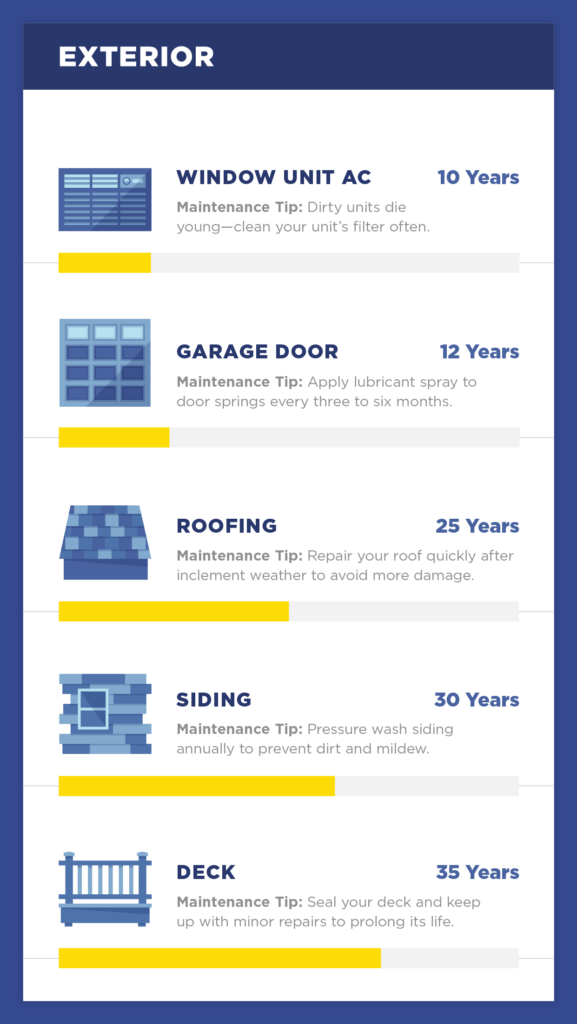
The typical window unit air conditioner can last anywhere from 8–12 years depending on how much it’s used and how well it’s taken care of. Be sure to turn the unit off when it’s not needed and clean the air filter often.
You can expect 10–15 years of reliable service from a garage door depending on how often it’s used. To prolong its life, apply lubricant spray to door springs every three to six months.
Siding can last anywhere from 20–40 years depending on the material used, weather conditions in your area and how well it’s taken care of. For instance, aluminum siding will last 15 years but needs to be repainted when it fades every five or so years. Wood siding that is painted or stained every five years should last decades. But vinyl siding is a popular choice because it can last up to 40 years and is virtually maintenance free! No matter what material you use to keep your siding clean to prevent dirt and mildew that can shorten its lifespan.
Most homeowners will need to re-roof their house every 20–30 years, although the type of shingles you use will impact this number. A metal roof can last even longer, up to 50 years, although it’s more expensive upfront and therefore less common. To get the longest life out of your roof ensure you check it after inclement weather and be sure to repair it quickly to avoid more damage.
Depending on the type of wood, your deck can last anywhere from 20–50 years. However, the average deck lasts around 35 years. Seal your deck and keep up with minor repairs to keep it strong and sturdy for many years.
Maintaining the interior of your home can keep it looking stylish and new. Even the most diligent cleaners will at some point have to replace worn out fixtures. Doing so proactively can help you avoid an emergency situation.
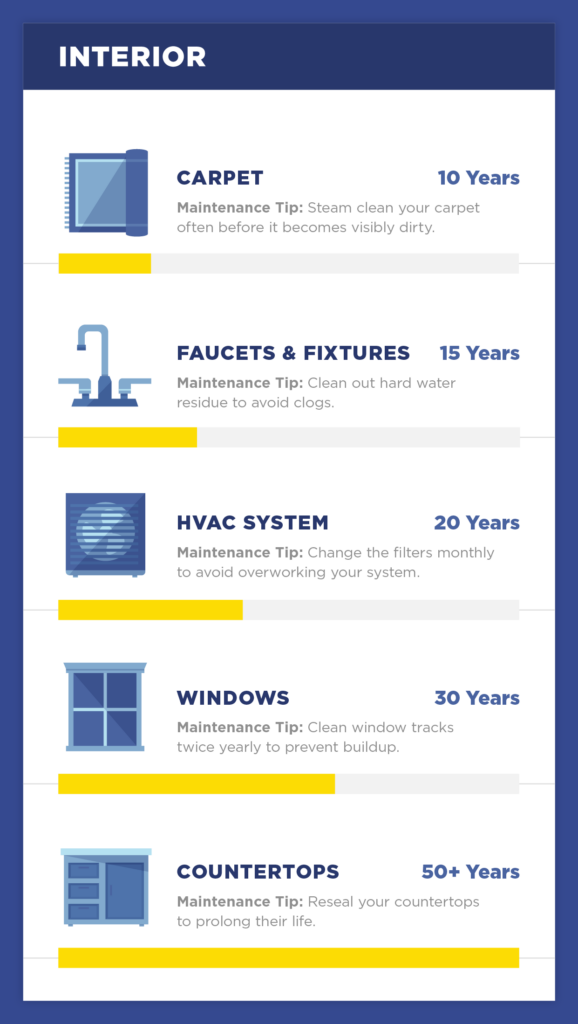
Carpet in your home typically has a 5– 15-year lifespan. It will eventually begin to wear out (in the most traveled areas) and it will need to be evaluated. If you notice it’s starting to look dirty, matted or has a foul odor, it’s time to replace it. It’s a maintenance best practice to steam clean your carpet often (before it becomes visibly dirty).
Properly cleaned and maintained faucets and fixtures can last anywhere from 10–20 years. However, if they are not properly cleaned they can last less than 10 years. If you want to make them last, clean out hard water residue often.
It’s best to replace your system around 15 years which means saving up the money and having a professional in mind to fix it. To get the longest life out of your HVAC change the filters often to avoid overworking your system.
Windows and skylights last so long that often people forget they need to be replaced at all. Good windows will last most people from 25–35 years or more, but you will know it’s time to change them when they start looking warn, begin to suffer damage or are not insulating your home properly. Be sure to clean window tracks twice yearly to prevent buildup and prolong their life.
It’s smart to invest in stone countertops such as granite or quartz because they last so much longer than laminate or cement countertops. Laminate countertops will last anywhere from 10-12 years, while a well-maintained stone countertop can last over 100 years! Keep your investments safe by avoiding contact with hot surfaces or cutting directly on them. Reseal your stone countertops often and they can last a lifetime.
The appliances in your home are some of the easiest things to fix and some of the more inexpensive to replace. While some people replace appliances as newer technology emerges, it’s most cost-effective to use them for the duration of their lifespan.
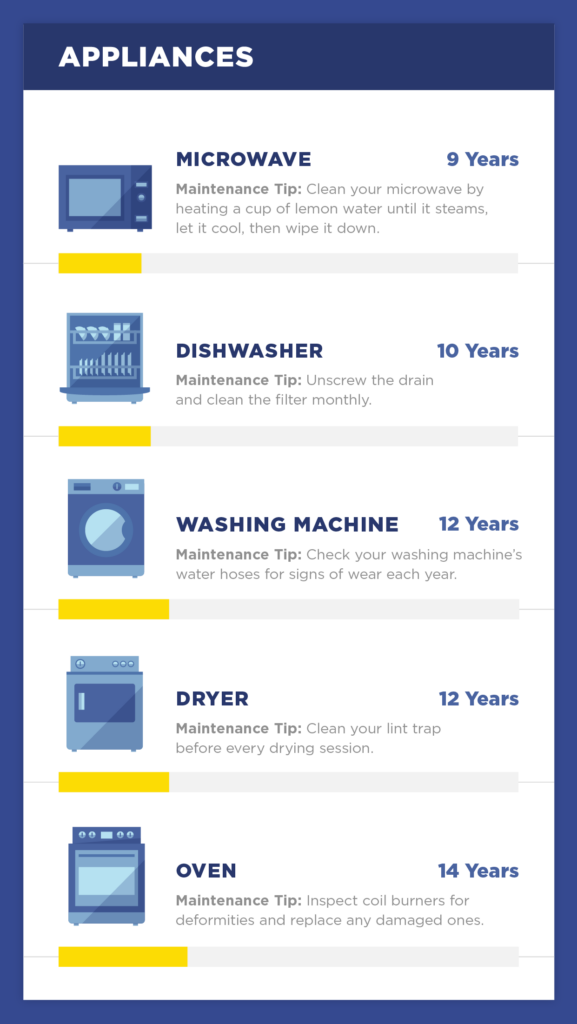
A microwave can last a long time if properly cared for. Usually, they last anywhere from 5–15 years and sometimes even longer depending on usage. When using your microwave, clean it often and avoid slamming the door. Never run your microwave without something inside, as it can cause serious damage.
Depending on the make and model, a dishwasher can last anywhere from 7–12 years. If you start to notice your dishwasher isn’t washing well, give it a good cleaning before giving up on it. To properly clean it, unscrew the drain and clean the filter monthly to prevent clogging. Once the filter is clean, empty the dishwasher completely (racks and all) and running it with a cup of distilled white vinegar inside it.
The average washing machine lasts between 10–15 years depending on the brand and how well it’s maintained. To stretch its usable years further, check your washing machines water hoses for signs of wear or weakness a few times each year.
Similar to your washing machine, your dryer should last anywhere from 10–15 years. If you buy them together, they likely will be ready to replace around the same time. If you notice it’s making strange noises or emitting strange smells, it might be nearing the end of its life. A good maintenance best practice is to clean your lint trap before every drying session.
Ovens these days will last anywhere from 10–20 years. Don’t wait until you start ruining meals to replace your oven. To ensure it’s running properly, inspect coil burners for deformities and replace any damaged ones.
There are other household items that may not necessarily be fixtures or appliances but are important and should be maintained nonetheless. Things like your mattress and sprinkler system are more obvious because you use them often. However, smaller things like smoke alarms, fire extinguishers and electrical wiring can cause damage if not properly maintained, so it’s important to keep your eye on them.
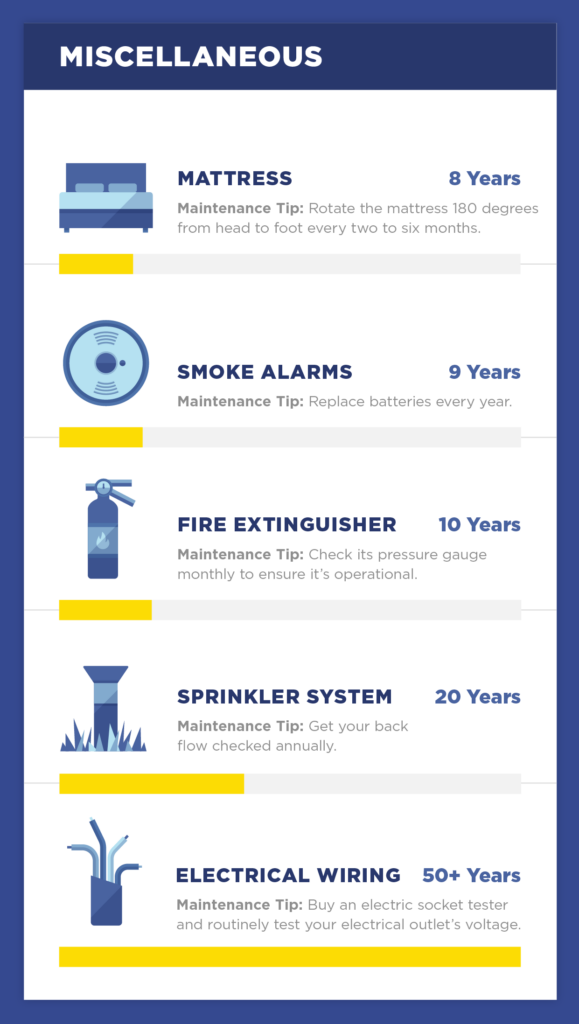
Your mattress is typically used more than most other things in your house and can collect dirt, dust and grime. It’s important to get a new mattress if yours starts to look or smell dirty, or if it’s losing its firmness. Most people get a new mattress every 7–10 years which is a good rule to follow. Make your mattress last longer by rotating it 180 degrees from head to foot every two to six months.
Three out of five home-related fire deaths occur in a house that has malfunctioning smoke detectors. It’s important to not only replace batteries every year but to replace the detectors and alarms every 8–10 years.
It can be tough to tell how old your fire extinguisher is if you didn’t buy it yourself as some don’t have expiration or purchase dates on them. A good way to tell if it’s working properly is to check its pressure gauge monthly to ensure the needle is in the green area of the pressure scale. If it’s damaged, has low pressure or you think it might be older than 10 years, it’s probably best to replace it.
If you’re lucky enough to have a good quality sprinkler system it can last you anywhere from 10–30 years! Take good care of it to ensure you’re on the high end of that scale. Get your backflow checked annually and drain the system of water during the winter if you’re in an area that freezes.
Old wiring can cause serious safety issues for you and your family. The good news is that wiring systems can last a lifetime if properly maintained. Buy an electric socket tester and routinely test your electrical outlets’ voltage. If you start to notice low voltage, get a tingling sensation when you touch the walls, smell burning anywhere in your home or have ungrounded outlets around your house it might be time to replace it.
In general, as long as you properly maintain your appliances, fixtures and household items you should get fairly long lives out of most of them. If you also save the recommended 1% of your home’s value every year for repairs you won’t be blindsided when a costly repair does need your attention. Use this list to anticipate your product’s lifespans and enjoy stress-free home repairs.
A home warranty won’t cover everything if it breaks down, but it will cover a great deal if you keep it up. I highly recommend them. Drop me a line if you need to find a good one. I can help.

Moving from a small town or suburb to a large city can be an intimidating proposition. Here are a few tips to help make your move as painless as possible.
Research before you move. It’s important to understand the culture you’re joining. Do research online and find out about school systems, neighborhoods, parking, weather, public transportation, and laws that are native to that area. If you can, visit a city before moving and connect with someone who’s lived there before.
Have a plan. There are a lot of steps to go through before you start packing the moving truck. Find housing before you leave, or at least know where you’ll stay while you look for a home. Never sign a lease on an apartment that you haven’t seen. If you can’t get there, find a friend or an employer to check for you. Have a job waiting for you, or if that’s not possible, know what you’ll do for money in the first few weeks of living there. Try to line up things like driver’s licenses, car insurance, renter’s insurance, and parking passes ahead of time as well.
Get involved. Meeting people in a big city can be daunting. Don’t expect the neighbors to knock your door down with a casserole when you arrive: city life is often too noisy and hectic. Take the initiative. If there are things you liked to do in your town, find ways to do those things in the city. Try new things. Volunteer. Big cities offer so many opportunities to engage other people, so find what you like.
Mind your wallet. City life is expensive. Everything costs more: food, insurance, clothes, rent. There are also a lot more ways to get ripped off, whether legally or criminally. Be careful how you spend, and know where your money is going.

Have you outgrown your home? Or has your home outgrown you and your household? Fewer and fewer families expect to stay in their first or second home for the long haul. Here are some factors to determine if you’re financially and emotionally ready to sell your house:
Moving is a big decision, one that requires careful consideration. If your needs have changed since you bought your home, don’t hesitate to get in touch.

What is it that makes the Willamette Valley so … eccentric?
[…] Whatever the reason, here you’re encouraged to do what you like, to follow your bliss, to blaze your own trail.
Oregon has long produced and attracted dreamers and drifters, misfits and mysteries, so it’s no wonder that the Willamette Valley claims more than its fair share of the freaky and the far out.
Starting in the south, near the Willamette River’s origins outside Eugene and extending north toward Portland, here’s your checklist of must-see monuments to the mysterious. Read More